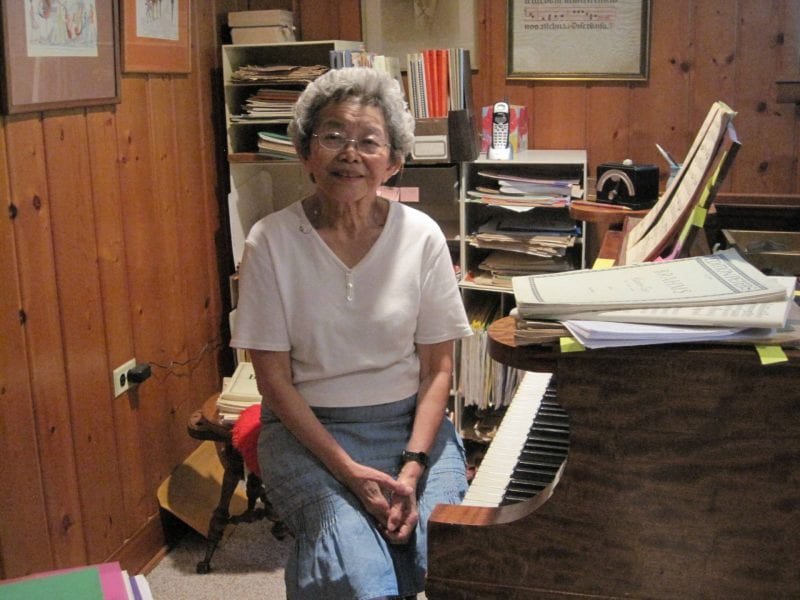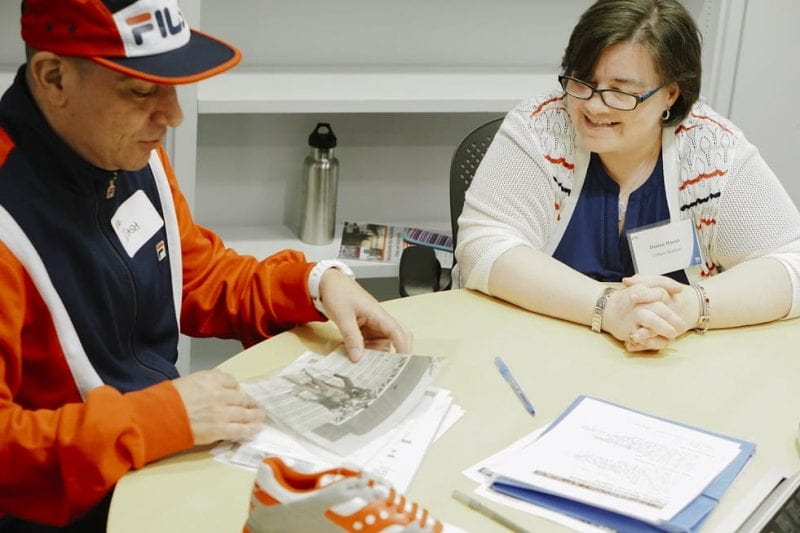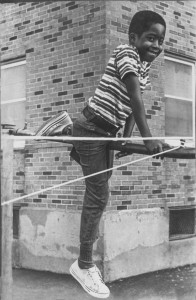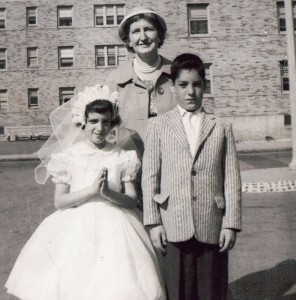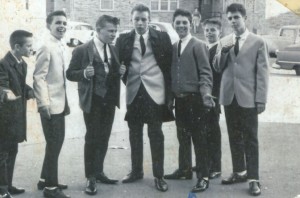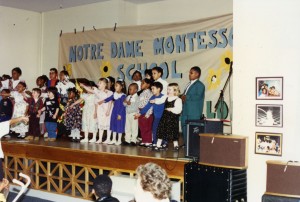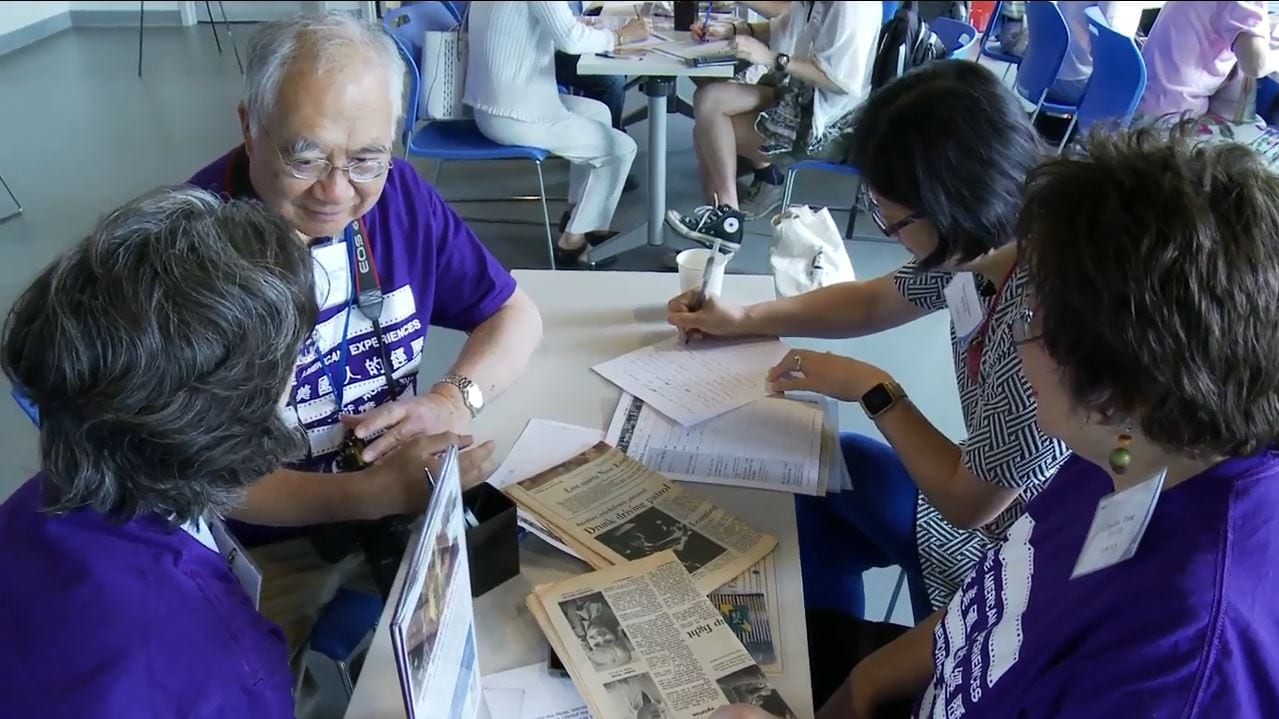
Contributors with volunteers at the information station at the Chinese American Experiences Mass. Memories Road Show in June 2018.
The Joseph P. Healey Library at the University of Massachusetts Boston is pleased to announce two funding awards: a $25,000 grant from the LYRASIS Catalyst Fund, and a $250,000 National Leadership Grant for Libraries awarded by the Institute of Museum and Library Services (IMLS). These awards will enable Healey Library, a pioneer in participatory archiving programs through its long-standing Mass. Memories Road Show, to build a suite of resources empowering libraries and cultural heritage organizations nationwide to lead their own community archiving programs and document the unique cultural heritage of their community members.
The LYRASIS Catalyst Fund award, launched in June 2018, will support the production of a video describing the Mass. Memories Road Show program and the development of a suite of online training materials to support libraries in the production of “personal archiving day” events with their communities. Healey Library expects the video and the training modules to be publicly available online by summer 2019.
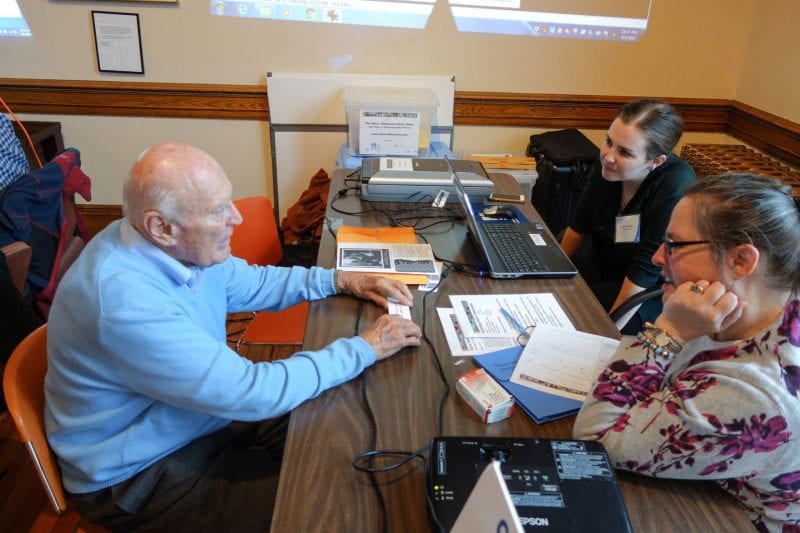
A contributor with volunteers at the scanning station at the Nahant Mass. Memories Road Show in 2017.
The IMLS award, launched in October 2018, will fund the development of a broad “roadmap” to guide libraries of all kinds through the process of planning participatory archiving programs with the communities they serve as well as in preserving the resulting digital collections and making them accessible. The roadmap, developed in close collaboration with archives and digital preservation experts and with a nationwide network of partners, will help libraries navigate the complexities of community partnerships, digitization event planning, and long-term digital preservation and access, all in support of the vital work of documenting their communities’ cultural heritage. Healey Library’s partners in the roadmap development include representatives from the Maine Historical Society, the Digital Public Library of America, the Metropolitan New York Library Council, the Massachusetts Archives, and the Boston Public Library. The roadmap is scheduled to be completed by fall 2020.
These two projects, taken together, will allow Healey Library to leverage its standing as a national leader in the participatory archiving movement to expand and enhance the capabilities of all libraries, regardless of size or available resources, to engage in and lead these vital community archiving initiatives themselves.

Volunteers and contributors at “Show ‘Em Whatcha Got” Mass. Memories Road Show: The Hip-Hop Edition, which was held at the Boston Public Library in May 2018. Nearly 300 digital images were collected and 60 video interviews were recorded in one day as part of this event.
Libraries are critical community hubs, and these two projects will enhance their ability to bring together diverse participants and to leverage librarians’ unique expertise as information professionals to anchor a community’s collective memory. By helping libraries implement archival preservation standards and best practices, build effective partnerships with their communities, launch successful community archiving events, and navigate channels for publishing and preserving cultural heritage materials, Healey Library, LYRASIS, and the IMLS can ensure the longevity of and access to diverse cultural heritage materials, particularly from groups who might never before have been able to elevate their stories to a national audience. Libraries throughout the country will be able to use these resources to partner more effectively with their communities in preserving and sharing the unique, valuable stories that document our nation’s collective cultural history.
Carolyn Goldstein, Public History and Community Archives Program Manager at Healey Library and Project Director for the IMLS and Catalyst awards, explains, “Community archiving events are a way of collectively telling and preserving a community’s story. Participatory archiving programs are opportunities for community members to add to the historical record photographs and stories that are important to them. These two grants will enable our team to share what we’ve learned from producing the Mass. Memories Road Show for fifteen years, and to collaborate with archival and library colleagues to assess the need and create a set of resources that will empower libraries around the country to document and preserve their communities’ histories and make them accessible.”
“To directly invest in our community of libraries and archives, the LYRASIS Catalyst Fund allows our members the chance to explore their groundbreaking ideas that will help the library and archive landscape at large,” explains Mary Meyer of LYRASIS. “We are very proud to support the Healey Library in its ‘Online Instruction for Participatory Archiving’ project and are excited about the wide impact this effort will have in sustaining cultural heritages in communities across the country.”
“As centers of learning and catalysts of community change, libraries and museums connect people with programs, services, collections, information, and new ideas in the arts, sciences, and humanities. They serve as vital spaces where people can connect with each other,” said IMLS Director Dr. Kathryn K. Matthew. “IMLS is proud to support their work through our grant making as they inform and inspire all in their communities.”
For additional information about these projects, please contact: Patricia Bruttomesso, Archival Collections Project Manager, at Patricia.Bruttomesso@umb.edu or 617-287-7696.
About the Joseph P. Healey Library at UMass Boston
 The Joseph P. Healey Library at the University of Massachusetts Boston plays a leading role in the dynamic culture of teaching and learning at Boston’s only public research university, while also supporting the campus’ commitment to urban and community engagement. University Archives and Special Collections (UASC) in the Healey Library collects materials related to the university’s history, as well as materials that reflect the institution’s urban mission and strong support of community service. UASC is committed to working with, promoting, and assisting community archives in the Greater Boston area and beyond through facilitating cross-organization collaboration and access to informational, educational, and practical resources relevant to archival procedures and best practices. Check in with Healey Library’s news and collections through Facebook, Twitter, and Instagram.
The Joseph P. Healey Library at the University of Massachusetts Boston plays a leading role in the dynamic culture of teaching and learning at Boston’s only public research university, while also supporting the campus’ commitment to urban and community engagement. University Archives and Special Collections (UASC) in the Healey Library collects materials related to the university’s history, as well as materials that reflect the institution’s urban mission and strong support of community service. UASC is committed to working with, promoting, and assisting community archives in the Greater Boston area and beyond through facilitating cross-organization collaboration and access to informational, educational, and practical resources relevant to archival procedures and best practices. Check in with Healey Library’s news and collections through Facebook, Twitter, and Instagram.
About the Institute of Museum and Library Services
 The Institute of Museum and Library Services is the primary source of federal support for the nation’s libraries and museums. They advance, support, and empower America’s museums, libraries, and related organizations through grantmaking, research, and policy development. Their vision is a nation where museums and libraries work together to transform the lives of individuals and communities. To learn more, visit www.imls.gov and follow them on Facebook and Twitter.
The Institute of Museum and Library Services is the primary source of federal support for the nation’s libraries and museums. They advance, support, and empower America’s museums, libraries, and related organizations through grantmaking, research, and policy development. Their vision is a nation where museums and libraries work together to transform the lives of individuals and communities. To learn more, visit www.imls.gov and follow them on Facebook and Twitter.
About LYRASIS
 LYRASIS is a 501(c)(3) non-profit membership organization whose mission is to support enduring access to the world’s shared academic, scientific and cultural heritage through leadership in open technologies, content services, digital solutions and collaboration with archives, libraries, museums and knowledge communities worldwide. LYRASIS is home to more than 1,000 member academic and public libraries, museums, archives and other collections-holding organizations located in 28 countries. The Catalyst Fund is a program administered by LYRASIS and Leaders Circle members. The Fund is designed to foster new ideas that will benefit the archive, library, and museum communities. Catalyst Fund awards support LYRASIS members as they test and try innovative approaches to advance their field.
LYRASIS is a 501(c)(3) non-profit membership organization whose mission is to support enduring access to the world’s shared academic, scientific and cultural heritage through leadership in open technologies, content services, digital solutions and collaboration with archives, libraries, museums and knowledge communities worldwide. LYRASIS is home to more than 1,000 member academic and public libraries, museums, archives and other collections-holding organizations located in 28 countries. The Catalyst Fund is a program administered by LYRASIS and Leaders Circle members. The Fund is designed to foster new ideas that will benefit the archive, library, and museum communities. Catalyst Fund awards support LYRASIS members as they test and try innovative approaches to advance their field.

